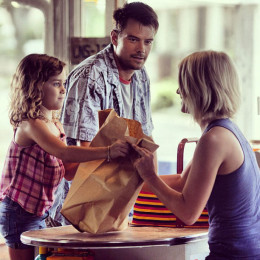Safe Haven
February 21, 2013
Hair clomped between a large hair clip that could pass as the kind that keep chip bags closed and body loosely encompassed by an over-sized, dreary colored hoodie, I filed into the dimly lit theater in the kind of way that Cady Heron from “Mean Girls” went about her first day of public high school, hoping to go unnoticed. Heron’s reason to act invisible was because she had dwelled in Africa for the past 12 years, and my reason was because I was emerging out of my “Lord of the Rings” shell to view a film by Nicholas Sparks.
I sat down (although a bit out of place with my non-body hugging clothing among all of the young girls) in the middle of the theater with tweens in front of me trying to pass as teens and elderly women behind me who dragged their loyal husbands with them to view the movie. Despite my eye rolls that could most likely be heard by the ushers outside the theater, along with the shifting in my seat at awkward scenes, it was quite an entertaining film.
Although I had a constant slight anticipation for Julianne Hough to express her love to Josh Duhamel through emotional love ballads and controversial dance in a sort of homage to her “Footloose” days, this failed to occur in “Safe Haven,” which was directed by Lasse Hallström and another in the line of Nicholas Sparks’ ignited films.
The beginning of the movie is as expected: two ridiculously tan, beautiful people who have a chance meeting in a very small town where anything can happen: stealing glances with each other through slightly broken windows, sharing half-smiles in an effort to conceal their immediate strong feelings for each other, and offering up odd gifts to each other that are looked upon as “cute” because once again they are extremely attractive young people. A romance begins to blossom as it does in any romantic movie.
One should remember, though, that Nicholas Sparks was not a screenwriter for “Clueless” or “Valentine’s Day” in which there are merely platonic friendships and protagonists with little to no back story involved: there is always a back story with Sparks, and usually it is somewhat alarming.
Katie’s is no different. Katie (Hough) comes from a small Boston town where she was married to an abusive husband, as is revealed within the first few scenes. After stabbing her husband, dying her hair blonde, and being accused of murder, she flees town in search of refuge from the harm brought upon her by her husband, or a “safe haven.” See, this is where the title of the movie could be connected to the plot, resulting in one of those “ah-ha!” moments, followed by stern head-turns from the tweens down in front, finally showing me that I need to keep those light bulb moments to myself, as they are not respected in theaters (but apparently the tweens think it is proper theater etiquette to regularly check the Facebook app on their smart phones with a normal brightness level).
Katie arrives in the small beach town of Southport, North Carolina dragging along a small slice of her past while simultaneously bringing with her a meager sum of cash, roughly two pairs of short-shorts, a handful of varied aqua-colored flannels that coincidentally accent the turquoise of her eyes, and a fear to grow close with others. Despite her well-established mistrust, she soon grows acquainted with local storeowner and widower, Alex Wheatley (Duhamel), and his two young kids, Lexie and Josh.
I could nearly make out the scribble of Sparks’ pencil across the screen when a new plot twist would unfold, thinking to myself, “classic Sparks.” Only that man could pull off three major plot twists, a romance between a widower with multiple children and a woman roughly ten years younger than he, a knife fight where the woman stabs the man, a cancer sub-plot, some degree of jealousy between men over the protagonist, a mysterious lower-level character who doesn’t reveal his or her true self until roughly two minutes before the credits start to roll and a setting of a North Carolina beach town. Typical Sparks.
As a warning, a handful of eye rolls are expected to occur at unrealistic “Law & Order” type cop scenes. The film will cause laughter when romance begins to bud into an awkward stage, tears when something happens to someone else non-specific (notice how you have to watch the movie to find out what I mean), sweating at intense scenes of fearful bike riding, and additional tears when you realize that Julianne Hough is not even attempting to resemble a model in a pair of Converse and a t-shirt, but she just simply does, even on her worst day.
Above all, “Safe Haven” was entertaining and contained multiple unforeseen and astonishing plot twists. Perhaps the film initially struck me as mediocre and inescapably predictable, but one should raise the question as to why I chose to view the film. My flimsy reasons for watching it are few; but I am a girl with little will power to resist Josh Duhamel, especially in a film riddled with humor, teeth-whitened smiles, and an inspiring literary message. I awarded the film 3.5 stars on a scale of 5.

